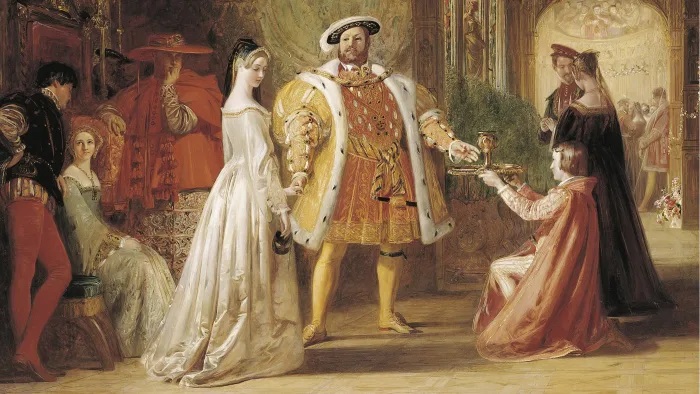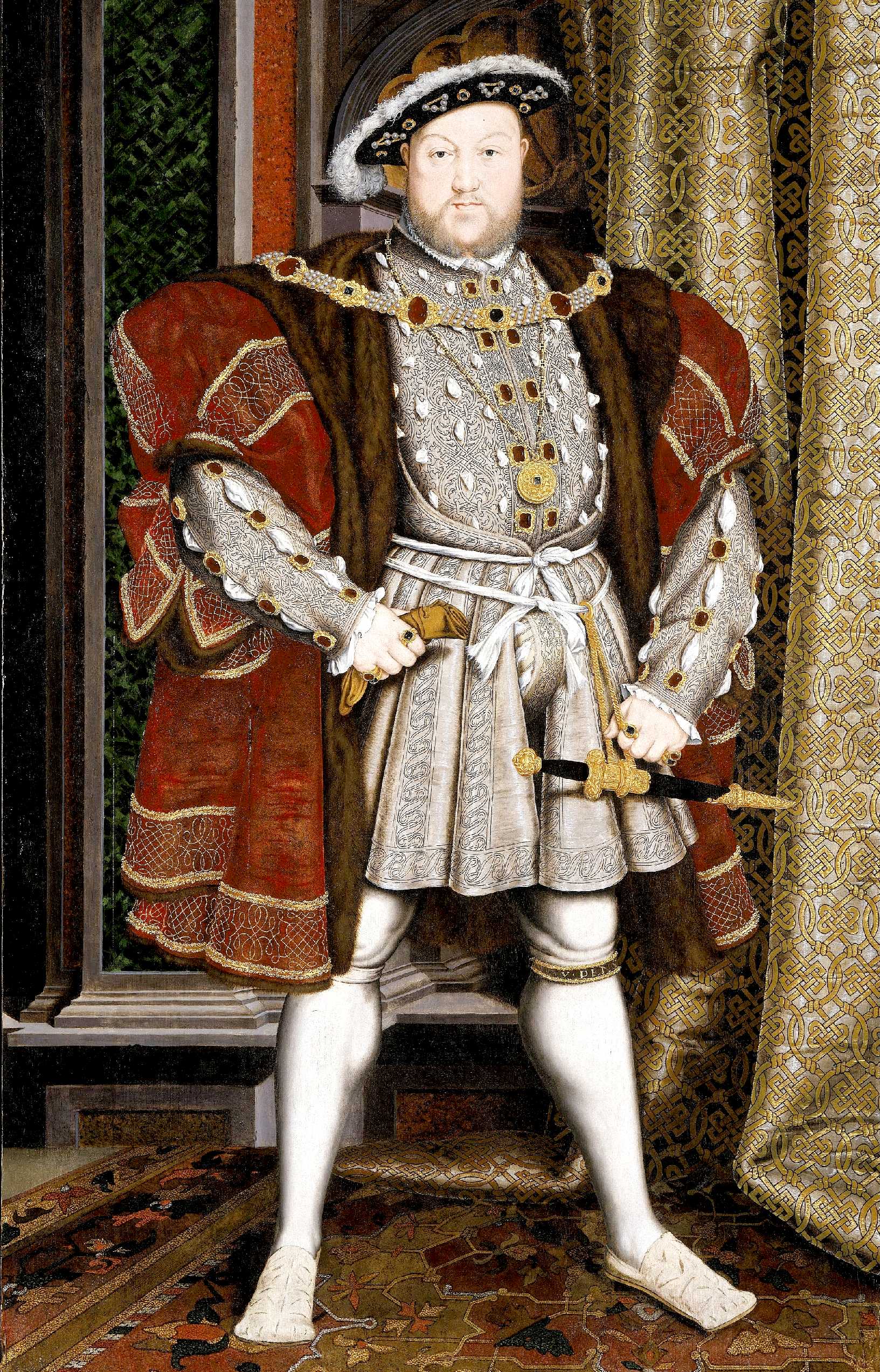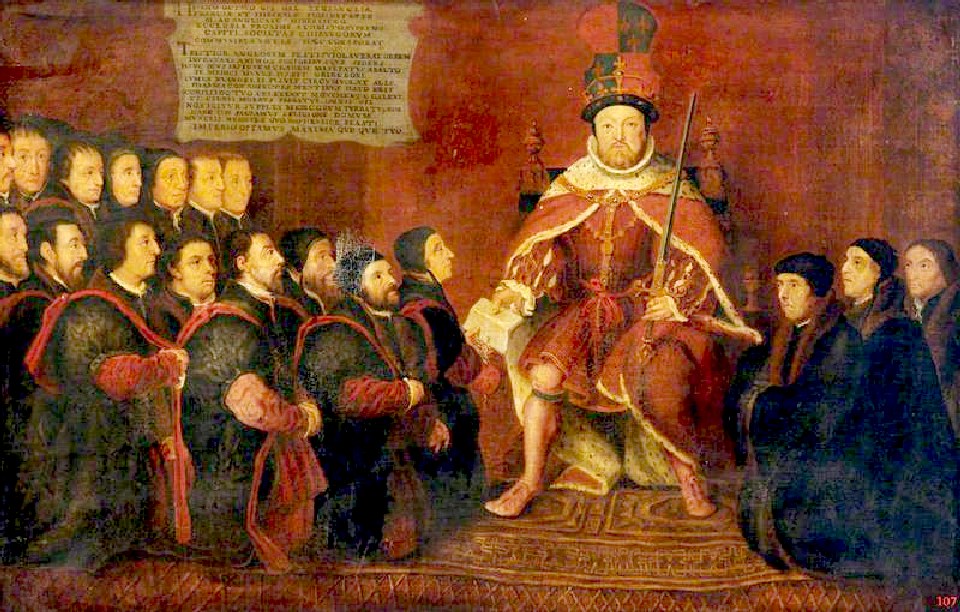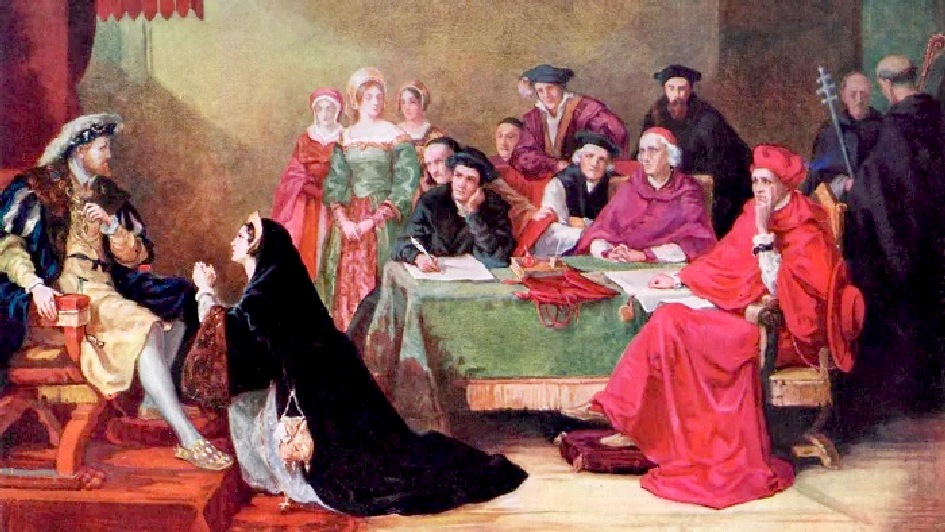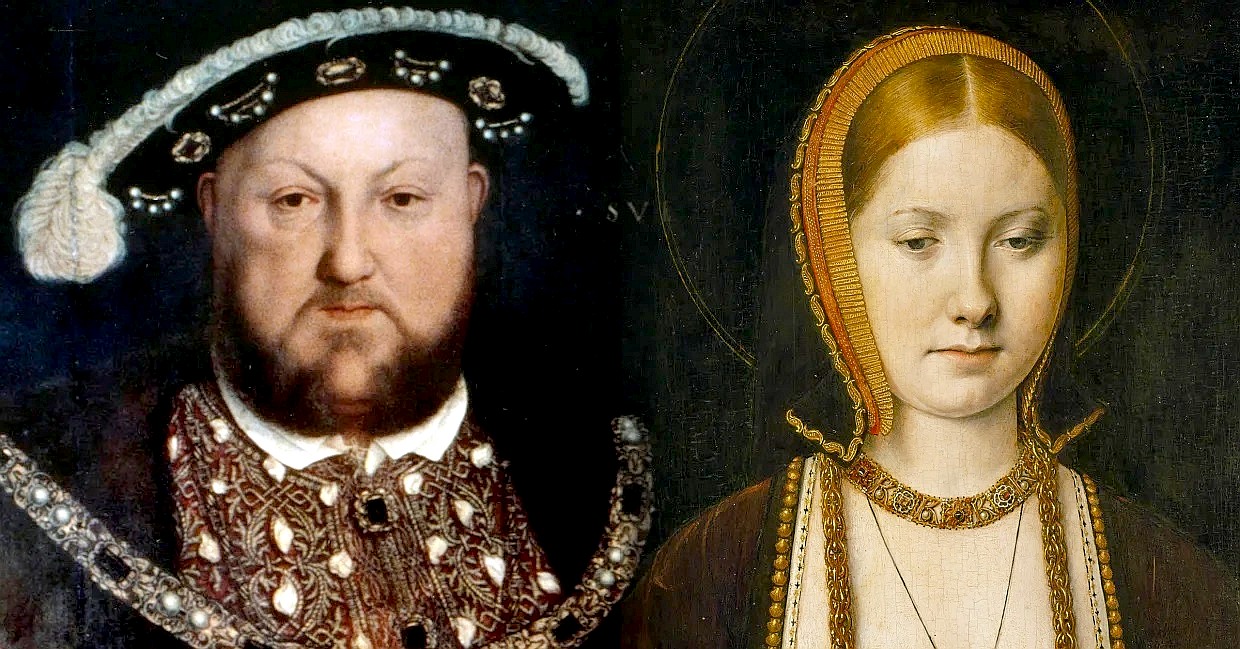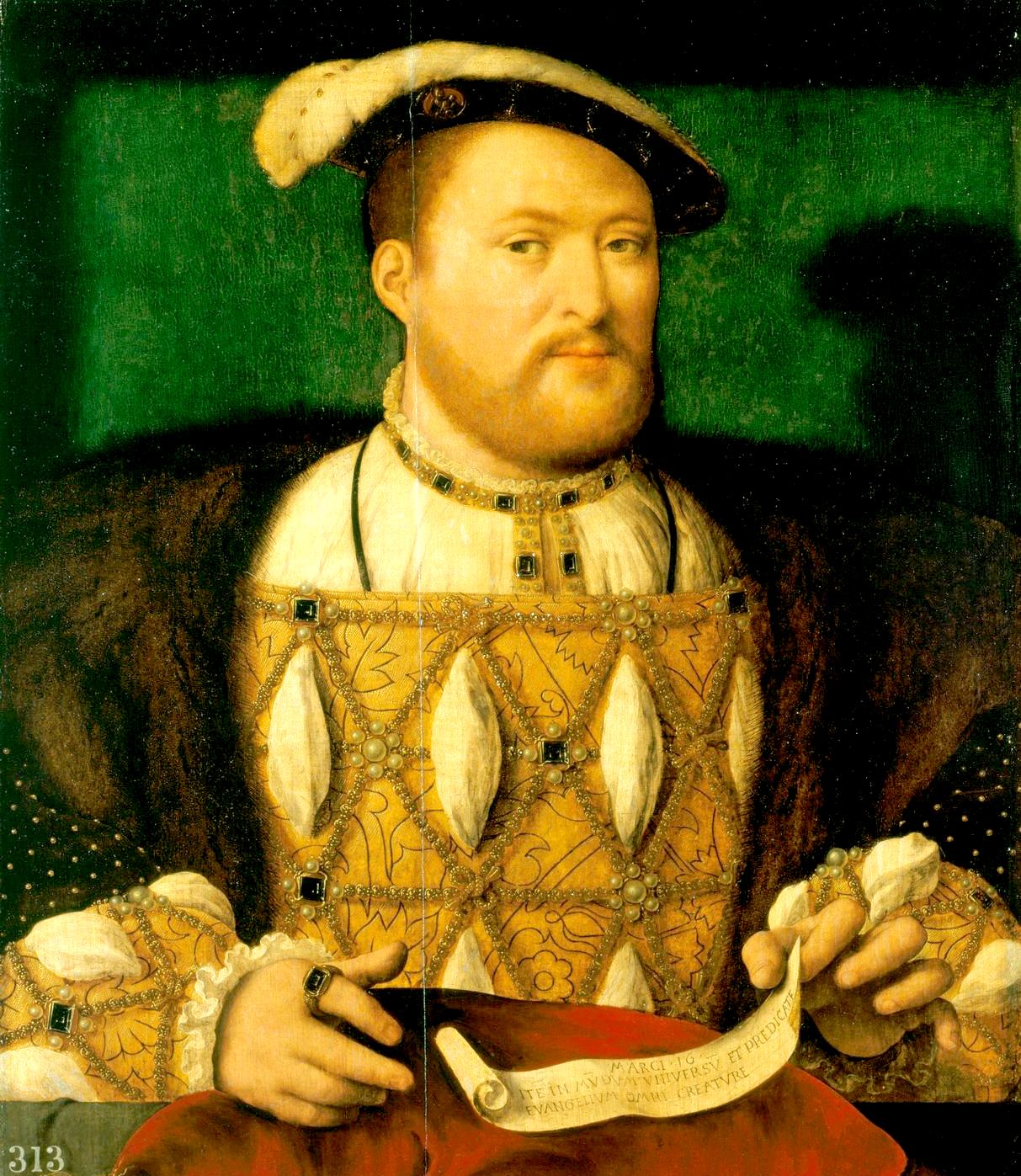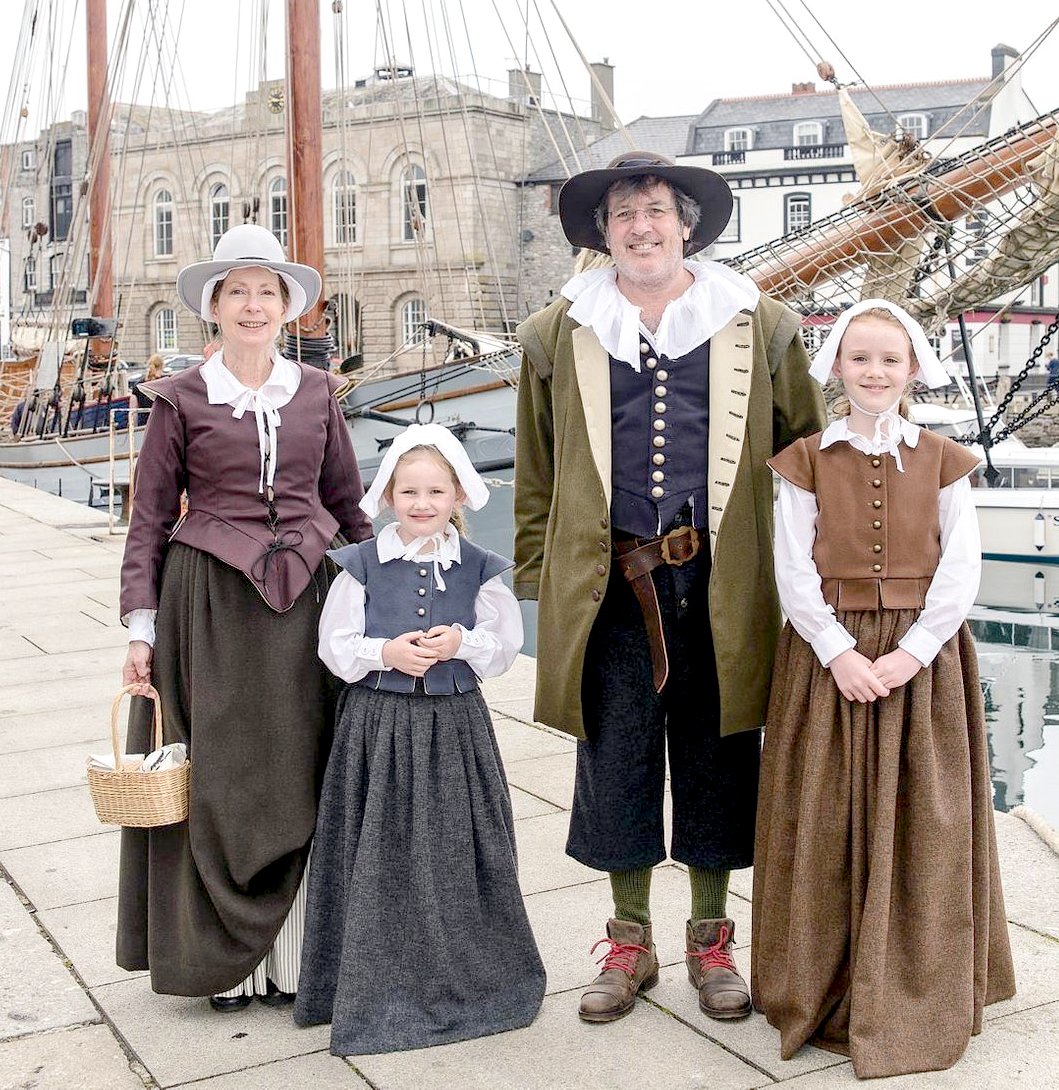|
HENRY VIII - CHURCH OF ENGLAND
Please use our A-Z INDEX to navigate this site or return HOME
|
|
In 1530, at Hampton Court Palace, King Henry VIII and his advisers penned a letter to Rome. In it, for the first time, Henry threatened to break with the Vatican and split off from the Catholic Church. As you might imagine, Rome probably thought he'd bitten off more than he could chew. But, four years later, in the 1534 Act of Supremacy, Henry carried through on that threat and the Church of England was born. This may have influenced the likes of Adolf Hitler, for such political adulterations saw Henry become the ultimate dictator, something extremely hard to pull off in the 20th Century. Though the Fuhrer managed something reasonably closely aligned, and both dictators used extreme methods to eliminate political adversaries. In Henry's case the lopping of heads. The constitutional foundation for Hitler's dictatorship was the Enabling Act on March 24, 1933. It gave Hitler the right to pass any law without the approval of the Reichstag. In efforts to breed a master race, more than 300,000 German Aryans were sterilized and countless numbers were gassed, under a law passed on July 14, 1933, the "Law for the Prevention of Genetically Diseased Offspring." By comparison to Adolf, Henry was a relatively well balanced individual.
Henry's lust for young female conquests drove him to write and re-write laws that would enable his roving eye to bed many fair maidens, who under English law today, would be considered under the age of consent. But in his time, mistresses around twelve and over were prime-time and fair game, so presumably they were smarter than girls today (the opposite is true with the internet and soaps) as far as the law stands, and if they had not been eligible, judging by his statutory manipulations, they would have been declared so. Henry's weakness in this department led to six marriages and who knows how many mistresses along the way, though some are mentioned. His youngest official bride was the seventeen year old Catherine Howard.
In Africa today, tribal marriages take place with brides are thirteen, yielding the healthiest offspring. And, just like our Henry, their warrior husbands demand purity and certificates of chastity. In the UK in 2021, sixteen is the age of consent, in the US it is 18 in most states, causing many problems. France has upped the age of consent to 15 recently, while Italy remains at 14. In the Philippines the age is 12, as in Angola. According to the NHS, the average age for girls to begin puberty is 11, for boys it is 12. It varies by region. Some late, some early. Clearly then, Henry was not unusual, he just wanted a healthy heir to his throne and enjoyed the physical exercise. Today, he might have been locked up for relations with his young mistresses, save that nobody would dare investigate. We could raise the age of consent to 35, and solve the population problem overnight. But we'd need some form of digital chastity device, for the authorities to be able to monitor illegal activity. We'd also need more dungeons to cope with delinquents, or bring back Henry's favourite: beheadings, and kill two birds with one stone, an early form of population control perhaps. (See below) What a bonus for climate change!
The English King may then be said to be a major contributory factor in the Founding Father's eventually taking to the high seas in the Mayflower, to plant a political seed that would eventually germinate into the War of Independence, severing ties with England's colonial rule. But first, England would attempt to colonize the America's bent on exploiting mineral and plantation wealth, until heavy taxations would cause rebellion and ultimately violent severance.
Many people in England felt that there were still too many similarities between the Church of England and Rome, and demanded greater reforms. Some even wished to purify the Anglican Church of all Catholic rituals. They became known as the Puritans. Others called for a break with the existing church, and became known as the Separatists. However, Henry VIII had decreed that all citizens were required to follow the state religion: the Anglican Church. Those who did not, would face prosecution - talk about denial of human rights. By the time King James I ascended the throne in 1603, the situation had become more tense.
HENRY VIII - During his time on the throne, the King is thought to have beheaded around 57,000 subjects, earning him a reputation as a butcher. Though he was not referred to as: "Henry the Butcher," many believe that such a title is well deserved. Of course he did not swing the axe himself. He employed a professional axe-man for that. Giving us the term getting axed, as in being fired from a job.
ASCENSION TO THE THRONE
King Henry VIII, born June 28, 1491, was the second son of Henry VII. Henry originally had an older brother, Arthur, but he died in 1502, leaving Henry heir to the throne. As a youth, Henry was tall and athletic, frequently engaged in hunting and sport, but also intelligent and academic. He spoke several languages and studied the arts and theological debate. As king, he wrote (with help) a text refuting the claims of Martin Luther, which resulted in the Pope granting Henry the title of "Defender of the Faith." Henry became king on the death of his father in 1509 and was welcomed by his kingdom as a dynamic young man.
Henry VIII created the Church of England in 1536 as a result of a dispute with the pope, who would not permit Henry to get a divorce from his wife and marry his long-time mistress. Henry's marital history started under a cloud of suspicion, as his marriage to Catherine of Aragon meant he was forming a union with his brother's widow. Whether his series of divorces was actually the result of his failure to produce a male heir or some other form of instability is a matter of some dispute, but the reason for forming the Anglican Church was to give Henry the right to act as the head of his own church and marry as he pleased.
BLOODLUST - Catherine of Aragon may well have begged for her life, but had little chance of keeping her head, with Henry VIII so adept at eliminating political enemies, and we assume, any other hindrance to his objectives, using such means. It's a lot less paperwork that imprisonment, and final. No appeals. This is something the present day justice system absorbed. Under English law at present there is no right of appeal. An Article 6 violation. That is nothing compared to the threat of nuclear proliferation, a United Nations violation.
GETTING THE CHOP - OFF WITH HIS HEAD
During the reign of Henry VIII, between 1509 and 1547, an estimated 57,000 English subjects lost their
heads - at the rate of 4.34 subjects a day. It was a violent time in history, but Henry VIII may have been particularly bloodthirsty, executing tens of thousands during his 36-year reign. By comparison, the daughter who succeeded him on the throne, who came to be called "Bloody Mary," killed fewer than 300 people during her six years as queen.
Only 50 executions a year, or one a week to satisfy her bloodlust,
compared to 30 a week under Henry. England could hardly be described as
merry.
MARRIAGE - Is an outdated concept, but makes for a wonderful day out for all the family. Giving everyone the opportunity to watch a well dressed couple commit to each other, but ultimately, with divorce rates so high, many might think the ritual forces promises that men and women cannot keep - in a modern world. That said, the wedding industry employs millions of people. Think to of all the lawyers that have mortgages to pay.
After years of marriage, Henry wanted to divorce
Catherine of Aragon. She had suffered through several still births and a handful of infant deaths and hadn't borne a son. Henry became obsessed with producing an heir to carry on the Tudor family lineage, and he finally convinced himself that his marriage to Catherine had been a sin in the eyes of God. He even believed the union's sin was the reason why his legitimate male children kept dying. So he set about obtaining an annulment from the church based on the edict stating that a man can never marry his brother's wife. The problem was, it was the pope who had sanctioned the marriage in the first place, on the basis of Catherine's oath that her marriage to Henry's brother was never consummated.
MISTRESSES & BEHEADINGS
Domestically, Henry is known for his radical changes to the English Constitution, ushering in the theory of the divine right of kings. He also greatly expanded royal power during his reign. He frequently used charges of treason and heresy to quell dissent, and those accused were often executed without a formal trial by means of bills of attainder. He achieved many of his political aims through the work of his chief ministers, some of whom were banished or executed when they fell out of his favour. Thomas Wolsey, Thomas More, Thomas Cromwell, Richard Rich, and Thomas Cranmer all figured prominently in his administration.
The Privy Council was informed of her affair with Dereham whilst Henry was away; Thomas Cranmer was dispatched to investigate, and he brought evidence of Queen Catherine's previous affair with Dereham to the King's notice. Though Henry originally refused to believe the allegations, Dereham confessed. It took another meeting of the council, however, before Henry believed the accusations against Dereham and went into a rage, blaming the council before consoling himself in hunting. When questioned, the Queen could have admitted a prior contract to marry Dereham, which would have made her subsequent marriage to Henry invalid, but she instead claimed that Dereham had forced her to enter into an adulterous relationship. Dereham, meanwhile, exposed Queen Catherine's relationship with Culpeper. Culpeper and Dereham were both executed, and Catherine too was beheaded on 13 February 1542.
FORTUNE
QUEEN ELIZABETH I - 1533 1603
The monarch became the supreme governor of the state church and its doctrine was officially defined through the 39 Articles in the reign of Henry's daughter, Elizabeth I. Odd that, one would have thought that God dictated doctrine, not men or women, deciding for God, what God wanted. However, the new Queen took advantage of her father's political gains, as has every king and queen since, save for one abdication.
Under
Elizabeth, England became a great naval power, and sowed the seeds of the
British
Empire. In 1584, Elizabeth gave Walter Raleigh a charter, allowing him to form a colony in America.
LINKS, CONTACTS & REFERENCE
https://history.howstuffworks.com/historical-figures/10-henry-viii-executions.htm
|
|
|
Please use our A-Z INDEX to navigate this site
This website is Copyright © 2021 Jameson Hunter Ltd
|
